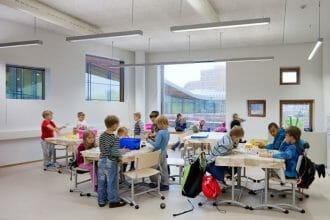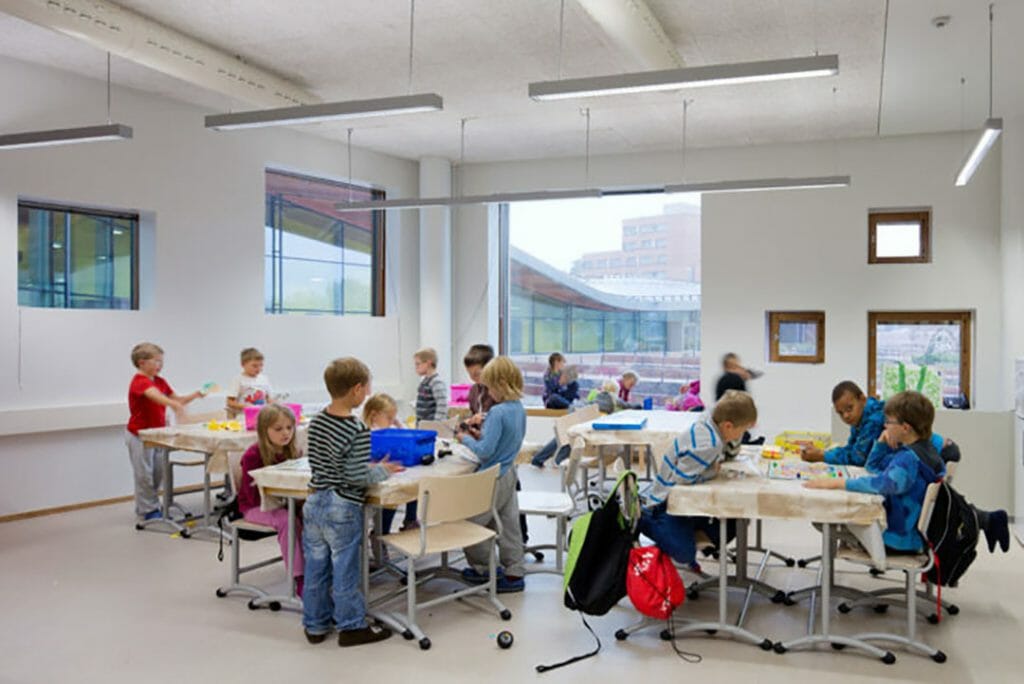
Photo by Andreas Meichsner for Verstas architects
In a press release sent today, global education publisher, advocate and futurist C.M. Rubin tells the story how in the 1970’s, Finland had an economic crisis that led the Government to realise that education was the foundation to improve quality of life and build a sustainable society for all its citizens. To achieve education excellence, the Finns realised that beyond academic achievement what mostly mattered was a new model that was equitable, accessible and flexible, giving priority to human well-being, quality of life and happiness. Today, Finland is one of the world’s leading models for quality education.
Since 2015, Rubin has been a contributor to the OECD’s four-year Future of Education and Skills 2030 study and the just released Learning Compass framework. The OECD’s new framework sets out a shared vision by widespread international stakeholders for what students should learn to be ready for the future. “Our planet faces numerous challenges as identified in the UN’s 17 Sustainable Development Goals,” says Rubin. “I believe that every global challenge we face, whether it be climate change, health and well-being, wealth inequality, gender equality, or peace and prosperity can be conquered if we are willing to pioneer new models of lifelong learning and assessment.”
She adds, “Our world has changed. Smart machines have edged their way into virtually every domain. What makes us human now matters more than ever. We need to understand our complex problems and determine what kind of learning models will resolve them.”
The OECD’s Learning Compass 2030, launched in May 2019, urges nations to take action and reevaluate the knowledge, life skills, values and attitudes learners need to flourish and contribute to the well-being of their communities and their planet. Experts have argued that global education systems have not changed in hundreds of years and that a factory model no longer works. Whether we’re talking about the 265 million children currently out of school, the children in school but doing poorly or the children entering “quality” programs currently, what competencies needed to thrive and how learning systems develop them require reflection and reform.
Rubin believes and writes about the importance of developing new models of lifelong learning and assessment. These new models would assume that modern learning requires a co-agency approach and recognizes that because of the unique time in which we live, students, teachers, parents and communities must all work together if learners and communities are to flourish.
For her 6 topics the ones one should focus upon, when developing those new models. These are: good health and well being, jobs automation and work in the age of robots, climate change, peace and stability, gender equality, The Impact on Humanity in the Age of Artificial Intelligence
1.Good Health and Well-Being
Rubin writes how the world, which is so focused in GDP, is actually undergoing a mental health crisis globally. “What good is GDP growth if people are unwell or dying? We are seeing record levels of suicide, drug abuse, anxiety, depression and school shootings, and our modern societal challenges are most likely to blame” she says.
The OECD Future of Education and Skills 2030 project highlight physical and mental health and well-being as a core foundation of every new learning model. So Rubin encites educators to look at these questions:
“What’s in your curriculum that’s irrelevant, i.e. simply creating curriculum overload and so should be removed? What’s in your curriculum that promotes mental and physical health and well-being as a top priority for every child? What’s in your curriculum that promotes resilience and the ability to cope in the face of a complex and uncertain world? What’s in your assessment that assures us your curriculum is succeeding?”
2.Job Automation and the Future of Work in the Age of Robots
Rubin criticises an eucation that prioritizes academic skills and fact-based college entrance exams. As automation risks jobs particularly to the younger generation, how to educate them so they are able to enjoy economic prosperity? Rubin encites curriculum leaders to ask the following questions:
“What competency focus in your curriculum will ensure your students can find work with employers in any part of the world or via their own entrepreneurial initiatives after graduation? What’s in your standardized test that can’t be google searched but clearly illustrates that the learner is a self-starter, can transfer learning to different contexts, can create new value, has a sense of purpose, can collaborate with others and can think both critically and creatively?”
3.Climate Change
What is possible to do in terms of education about climage change? The questions here should be?
“What’s in your curriculum that equips people with the skills, agency, and moral compass to take responsibility for their planet and do everything in their power to reverse the climate crisis? What’s in your assessment that assures us your curriculum is succeeding?”
4.Peace and Stability
Rubin writes: “Migration, urbanization and increased connectivity via the Internet are reshaping our societies. Conflicts based on nationality, ethnicity, race, class and gender are both local and global challenges. How do we create a culture in which people are empathetic, willing to embrace tolerance and respect the diversity of human beings? “
Education should then focus on developing in learners, better ways to effectively communicate, collaborate and reconcile tensions with people from other socio-economic backgrounds and cultures? What’s in your assessment that assures us your curriculum is succeeding?
5. Gender Equality
Goal 5 of the UN’s Sustainable Development Goals is to achieve gender equality and empower all females. The gender gap is holding back economic growth in every country and the ones mostly affected are women and girls. Rubin asks concerning new models of education: “What in your curriculum challenges gender biases and encourages girls to develop their talents, choose their own paths and excel in subjects usually thought to be best for boys?”
6.The Impact on Humanity in the Age of Artificial Intelligence
The novelty of the Smart machines we are now dealing with is that they bring us an intelligence that is radically different. Rubin writes though how regardless of these new machines, our ability to show originality, empathy, respect, and the willingness to collaborate with others will matter more. ” What’s in your curriculum to prepare learners for a future where what makes us human will matter more than ever? What’s in your assessment that assures us your curriculum is working?”
Rubin has been since 2015 a contributor to the OECD’s 4 year Future of Education and Skills 2030 project and Learning Compass concepts. I encourage learning systems to study the conclusions shared by the international stakeholders and find ways to build better models of learning that work for our children, for all learners, and for our world.
The full article can be accessed here

Founder Dinis Guarda
IntelligentHQ Your New Business Network.
IntelligentHQ is a Business network and an expert source for finance, capital markets and intelligence for thousands of global business professionals, startups, and companies.
We exist at the point of intersection between technology, social media, finance and innovation.
IntelligentHQ leverages innovation and scale of social digital technology, analytics, news, and distribution to create an unparalleled, full digital medium and social business networks spectrum.
IntelligentHQ is working hard, to become a trusted, and indispensable source of business news and analytics, within financial services and its associated supply chains and ecosystems












